Topics
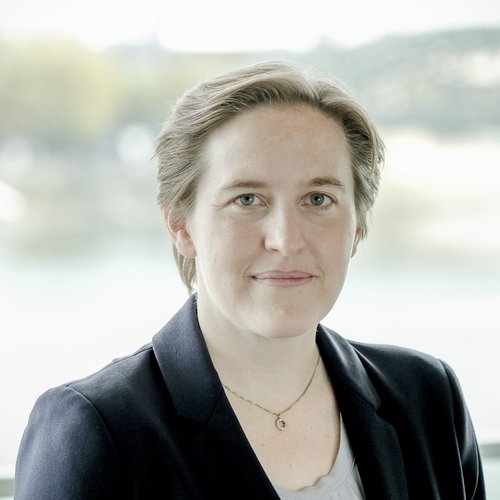
Dr. Judith Niehues
Head of Micro Data and Distribution Research Unit
Tel: +49 221 4981-768 Mail: niehues@iwkoeln.de- Since 2011 at the IW
- Since 2022 Head of the Microdata and Distribution Research Unit
- Born 1982 in Münster
- Studied economics at the University of Cologne and San Diego State University, doctoral studies in the SOCLIFE research training group at the University of Cologne
Research groups
IW Publications
Niehues, Judith / Stockhausen, Maximilian, 2022, Die Mittelschicht im Fokus – Abgrenzung, Entwicklung und Mobilität, in: IW-Trends, 49. Jg., Nr. 2, S. 27-53
Zur Studie
Diermeier, Matthias / Niehues, Judith, 2021, Demokratische Resilienz in Deutschland?. Parlamentarische Verfahrensakzeptanz im Licht individueller Problemwahrnehmung, in: IW-Trends, 48. Jg., Nr. 3, S. 89-112
Zur Studie
Niehues, Judith / Stockhausen, Maximilian, 2021, An international comparison with a special focus on the case of Germany. Inequality revisited, IW-Report, Nr. 18, Köln / Berlin
Zur Studie
(in cooperation with Ralph Henger)
Wohngeldreform 2020 – Stärkung eines vernachlässigten Instruments
IW-Kurzbericht 32/2019
(in cooperation with Matthias Diermeier)
Einschätzungen zur Arbeitslosigkeit – Unwissen befördert systemisches Misstrauen
IW-Trends 2/2019
Subjektive Umverteilungspräferenzen in Deutschland – Wunsch und Wirklichkeit
IW-Trends 1/2019
(in cooperation with Knut Bergmann, Matthias Diermeier)
AfD-Ergebnis nicht allein durch abgehängte Regionen erklärbar
IW-Kurzbericht 36/2018
Die Einkommens- und Vermögensungleichheit Deutschlands im internationalen Vergleich
IW-Kurzbericht 29/2018
Einkommen in Europa – Arm und Reich ist auch eine Frage des Maßstabs
IW-Kurzbericht 8/2018
Einkommensentwicklung, Ungleichheit und Armut – Ergebnisse unterschiedlicher Datensätze
IW-Trends 3/2017
(in cooperation with Matthias Diermeier, Henry Goecke, Tobias Thomas)
Verzerrte Wahrnehmung: Wie Berichte über Ungleichheit verunsichern
IW-Kurzbericht 63/2017
(in cooperation with Knut Bergmann, Matthias Diermeier)
NRW-Wahl – Nur wenige AfD-Wähler arbeitslos
IW-Kurzbericht 51/2017
Armuts- und Reichtumsberichterstattung
IW-Report 17/2017
(in cooperation with Christina Anger, Michael Hüther, Hans-Peter Klös, Klaus-Heiner Röhl, Holger Schäfer)
Gerechtigkeitspolitische Handlungsfelder in Deutschland – relevante Probleme angemessen angehen
IW policy papers 10/2017
(in cooperation with Susanna Kochskämper)
Entwicklung der Lebensverhältnisse im Alter
IW-Trends 2/2017
Die Mittelschicht in Deutschland – vielschichtig und stabil
IW-Trends 1/2017
(in cooperation with Martin Beznoska, Ralph Henger, Tobias Hentze, Hans-Peter Klös, Hagen Lesch, Jochen Pimpertz, Axel Plünnecke, Holger Schäfer, Jörg Schmidt, Christoph Schröder, Michael Voigtländer, Dirk Werner)
Faktencheck Gerechtigkeit und Verteilung – eine empirische Überprüfung wichtiger Stereotype
IW-Report 29/2016
(in cooperation with Kristin Fischer)
Einkommensverteilung – Keine amerikanischen Verteilungsverhältnisse in Deutschland
IW-Kurzbericht 47/2016
(in cooperation with Galina Kolev)
Ist Ungleichheit schlecht für das Wirtschaftswachstum? – Eine Neubewertung des Zusammenhangs für Deutschland
IW-Report 14/2016
(in cooperation with Michael Voigtländer)
Wohneigentumsquote – Geringe Dynamik in der Wohneigentumsbildung
IW-Kurzbericht 22/2016
(in cooperation with Knut Bergmann, Matthias Diermeier)
Parteipräferenz und Einkommen – Die AfD, eine Partei der Besserverdiener?
IW-Kurzbericht 19/2016
(in cooperation with Galina Kolev)
The Inequality-Growth Relationship. An Empirical Reassessment
IW-Report 7/2016
(in cooperation with Markus Demary)
Die Auswirkungen von Niedrigzinsen und unkonventionellen geldpolitischen Maßnahmen auf die Vermögensverteilung
IW policy papers 15/2015
Subjektive Ungleichheitswahrnehmung und Umverteilungspräferenzen – Ein internationaler Vergleich
IW-Trends 2/2014
(in cooperation with Thilo Schaefer, Christoph Schröder)
Arm und Reich in Deutschland –Wo bleibt die Mitte?
IW-Analysen – Forschungsberichte, Nr. 89, Köln 2013
Staatliche Umverteilung in der Europäischen Union
IW-Trends 1/2013
(in cooperation with Hubertus Bardt, Holger Techert)
Die Förderung Erneuerbarer Energien in Deutschland - Wirkungen und Herausforderungen des EEG
IW-Positionen – Beiträge zur Ordnungspolitik Nr. 56, Köln 2012
(in cooperation with Jochen Pimpertz)
Alterssicherung der Selbstständigen in Deutschland
IW-Trends 3/2012
(in cooperation with Christoph Schröder )
Integrierte Einkommens- und Vermögensbetrachtung
IW Trends 1/2012
Expertises
(in cooperation with Martin Beznoska, Maximilian Stockhausen
Vermögensverteilung im internationalen Vergleich
Gutachten für die Vereinigung der Bayerischen Wirtschaft, 2018
(in cooperation with Martin Beznoska, Tobias Hentze)
Vermögensverteilung – Vorurteilen auf der Spur
Gutachten im Auftrag der Vereinigung der Bayerischen Wirtschaft e.V. (vbw), 2017
(in cooperation with Ralph Henger, Michael Voigtländer)
Wohngeldreform 2016 – Mikrosimulationsrechnungen zur Leistungsverbesserung des Wohngeldes
Gutachten für das Bundesinstitut für Bau-, Stadt- und Raumforschung (BBSR) im Bundesamt für Bauwesen und Raumordnung (BBR), 2016
Vermögensverteilung und Altersgruppeneffekte – Eine Dekompositionsanalyse
Kurzstudie für die Carl-Deilmann-Stiftung, 2015
(in cooperation with Henry Goecke)
Verteilungswirkungen der Agenda 2010 – Eine Mikrosimulationsanalyse der Hartz-IV-Reform
Gutachten für die Initiative Neue Soziale Marktwirtschaft, 2014
(in cooperation with Hubertus Bardt)
Umverteilung im Wärmemarkt nach Vorbild des EEG? – Das Ausmaß der Verbraucherbelastung durch eine weitere Umlagefinanzierung
Gutachten, 2013
(in cooperation with Hubertus Bardt, Ralph Brügelmann, Thilo Schaefer)
Alternative Möglichkeiten der steuerlichen Finanzierung der EEG-Kosten - Aufkommens- und Verteilungseffekte
Kurzgutachten im Auftrag des Gesamtverbands der deutschen Textil- und Modeindustrie, 2012
(in cooperation with Hubertus Bardt, Holger Techert)
Das Erneuerbare-Energien-Gesetz, Erfahrungen und Ausblick
Kurzstudie INSM, Köln 2012
External Publications
Diermeier, Matthias / Niehues, Judith, 2023, Punching up or Punching down?. How Stereotyping the Rich and the Poor Impacts Redistributive Preferences in Germany, in: SOEP papers, No. 1182, 36 Seiten
Zur Studie
Diermeier, Matthias / Niehues, Judith, 2022, Towards a nuanced understanding of anti-immigration sentiment in the welfare state. a program specific analysis of welfare preferences, in: Rationality and Society, Seite 1-33
Zur Studie
Hüther, Michael / Niehues, Judith, 2022, Perception and Reality: Inequality and Unemployment in Germany, in: Journal of Contextual Economics – Schmollers Jahrbuch, Vol. 141 (2021), pp. 25–45
Zur Studie
Ungleichheitswahrnehmung und Umverteilungspräferenzen - ein internationaler Vergleich
Christoph Oslislo, Rebekka Rehm (Hrsg.): Ungleichheit und Umverteilung, Sammelband zur Ringvorlesung im Wintersemester 2017/2018 an der Universität zu Köln, 2018, S. 26–30
Deutschlands Mittelschicht in Abstiegsangst? Eine Betrachtung aus ökonomischer Perspektive
Nadine Schöneck, Sabine Ritter (Hrsg.): Die Mitte als Kampfzone, Bielefeld, 2018
(in cooperation with Galina Kolev)
Ungleichheit und Wirtschaftswachstum – ein nicht-linearer Zusammenhang
ifo Schnelldienst, 71. Jg., Heft 15, 2018, S. 6–9
Entwicklung der sozialen Ungleichheit in Deutschland - Fakten und subjektive Wahrnehmungen
Martin Dabrowski, Judith Wolf (Hrsg.): Armut und soziale Gerechtigkeit in Deutschland, Paderborn, 2018
(in cooperation with Anja Katrin Orth)
Die gespaltene Mitte. Werte, Einstellungen und Sorgen
RHI-Diskussion, Nr. 30, München, 2018
(in cooperation with Knut Bergmann, Matthias Diermeier)
Ein komplexes Gebilde. Eine sozio-ökonomische Analyse des Ergebnisses der AfD bei der Bundestagswahl 2017
ZParl Zeitschrift für Parlamentsfragen, 49. Jg, Heft 2, 2018, S. 243–264
(in cooperation with Christoph Schröder)
Arme ärmer, Reiche reicher? – Auf die Perspektive kommt es an
ifo schnelldienst, 70. Jg., Heft 10, 2017, S. 13–15
Verunsicherte Milieus – eine Mittelschicht in Abstiegsangst
Rolf Frankenberger, Siegfried Frech, (Hrsg.): Soziale Milieus, Schwalbach am Taunus, 2017, S. 127–141
(in cooperation with Matthias Diermeier, Henry Goecke, Tobias Thomas)
Impact of Inequality-Related Media Coverage on the Concerns of German Citizens
Düsseldorf Institute for Competition Economics, Discussion Paper, No. 258, pp. 2–35
(in cooperation with Knut Bergmann, Matthias Diermeier)
Allzeit fern des Durchschnitts: Politische Ansichten der AfD-Anhänger
Forschungsjournal Soziale Bewegungen, 30. Jg., Heft 2, 2017, Seite 12–25
(in cooperation with Knut Bergmann, Matthias Diermeier)
Die AfD: Eine Partei der sich ausgeliefert fühlenden Durchschnitts-verdiener?
ZParl Zeitschrift für Parlamentsfragen, 48. Jg, Heft 1, 2017, S. 57–75
Verunsicherte Milieus – eine Mittelschicht in Abstiegsangst?
Der Bürger im Staat, Heft 2/3, 2016, S. 143–149
(in cooperation with Markus Demary)
2016, Kein Anstieg der Vermögensungleichheitseit der Niedrigzinsphase
ifo Schnelldienst, Heft 13, 2016, S. 9–12
(in cooperation with Hubertus Bardt)
Verteilungswirkungen des EEG
Springer Vieweg, Energie in Naturwissenschaft, Technik, Wirtschaft und GesellschaftInterdisziplinär, Aspekte der Energiewirtschaft, 2016, S. 3–10
Ungleichheit: Wahrnehmung und Wirklichkeit – ein internationaler Vergleich
Wirtschaftsdienst, 96. Jg, Sonderheft, S.13–18
Reiche immer Reicher? – Fakten und Fiktionen zur Vermögensentwicklung
Die Politische Meinung, Vermögen, Reichere Reiche? Ärmere Arme? Mittellose Mitte?, 60. Jg., Heft 532, 2015, Osnabrück, S. 19–24
Cross-Country Differences in Perceptions of Inequality
Annual Report 2014 – Lindau Nobel Laureate Meetings, 2014, S. 52–53
(in cooperation with Christoph Schröder)
Einkommens- und Vermögensverteilung: zwischen Wahrnehmung und Wirklichkeit
Wirtschaftsdienst, 94. Jg., Heft 10, 2014, S. 700–703
Die Mittelschicht – stabiler als gedacht
APuZ (Aus Politik und Zeitgeschichte), Heft 49, 2014, S. 10–17
(in cooperation with Andreas Peichl)
Upper bounds of inequality of opportunity: theory and evidence for Germany and the US, in: Social Choice and Welfare, Vol. 43, No. 1, 2014, pp. 73–99
Zeitschrift für Energiewirtschaft, Ausgabe 1/2013, S. 211–218
(in cooperation with Hubertus Bardt)
Verteilungswirkungen des EEG
Renewable Energy Law and Policy Review, 3 (4), 2013, pp. 245–250
(in cooperation with Hubertus Bardt)
The Unequal Burden-Sharing of the German Energy Transformation
Journal of European Social Policy, 22 (5), 2012, pp. 453–469
(in cooperation with Andreas Kammer, Andreas Peichl)
Welfare State Regimes and Distributional Outcomes in Europe
Wirtschaftsdienst, 92. Jg., Heft 8, 2012, S. 507–512
(in cooperation with Holger Techert, Hubertus Bardt)
Ungleiche Belastung durch die Energiewende: Vor allem einkommensstarke Haushalte profitieren
Research on Economic Inequality, Volume 19, 2011, pp. 99–129
(in cooperation with Lina Dunnzlaff, Dirk Neumann, Andreas Peichl)
Equality of Opportunity and Redistribution in Europe
IZA Discussion Paper No. 5834, 2011
(in cooperation with Andreas Peichl)
Lower and Upper Bounds of Unfair Inequality: Theory and Evidence for Germany and the US
Bent Greve (Hrsg.): European Journal of Social Security, 13 (2), 2011, pp. 288–290
Book Review ‘Choice – Challenges and Perspectives for the European Welfare States’
Public Finance Review, 38 (4), 2010, pp. 473–500
(in cooperation with Clemens Fuest, Andreas Peichl)
The Redistributive Effects of Tax Benefit Systems in the Enlarged EU
SOEPpapers on Multidisciplinary Panel Data Research No. 336, 2010
More from Dr. Judith Niehues
Punching up or Punching down?: How Stereotyping the Rich and the Poor Impacts Redistributive Preferences in Germany
Redistribution and the welfare state have been linked by academic discourse to narratives that portray specific societal groups as ‘deserving’ or ‘undeserving’. The present analysis contributes to this scholarship in a twofold manner.
IW

The difficulties of universal redistribution in times of welfare chauvinism
Previous studies have found substantial support across Europe for the creation of a universal basic income system. Yet as Matthias Diermeier and Judith Niehues explain, there is also widespread support for restricting the access of immigrants to state benefits. Drawing on new research, they assess how these two perspectives shape wider attitudes toward welfare.
IW
Towards a nuanced understanding of anti-immigration sentiment in the welfare state: a program specific analysis of welfare preferences
The literature on immigration and the welfare state describes a trade-off between immigration and welfare support. We argue for a more nuanced view of welfare chauvinism that accounts for different motivational channels, specific welfare programs and particular population subgroups.
IW
Perception and Reality: Inequality and Unemployment in Germany
Data for the time before the corona pandemic reveal a largely positive picture of the economic and social development in Germany. Most individuals perceived their own situation as very positive, but their views on society are rather pessimistic and overly critical.
IW
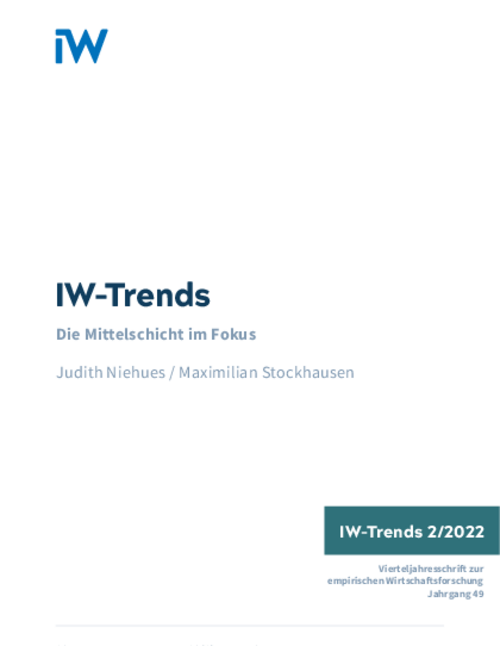
A Focus on the Middle Class - Demarcation, Development and Mobility
In 2018, roughly every second German was a member of the middle class as measured by income, a proportion which has barely changed for more than a decade. However, the lower income threshold of this middle-income group has risen - an indication of increased prosperity.
IW
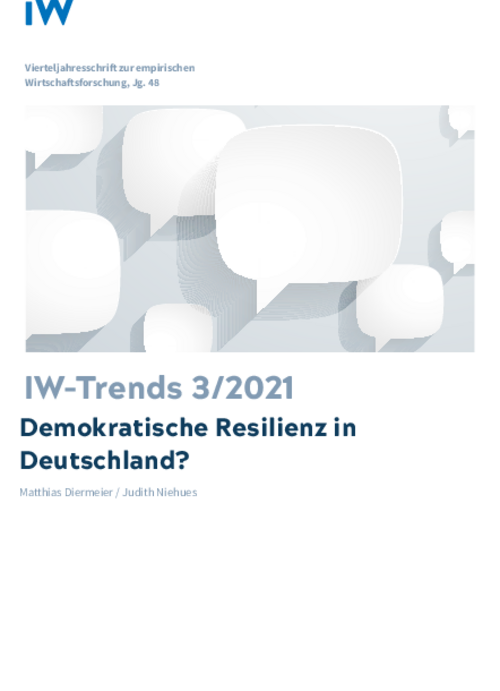
Acceptance of Parliamentary Procedures in the Light of Individual Problem Perception
A lively democracy thrives on the struggle between different interest groups for majority opinion on specific issues. Though the institutionalised process of balancing interests and hearing opposing points of view takes time, acceptance of these parliamentary procedures is essential for the functioning of our pluralistic democracy.
IW
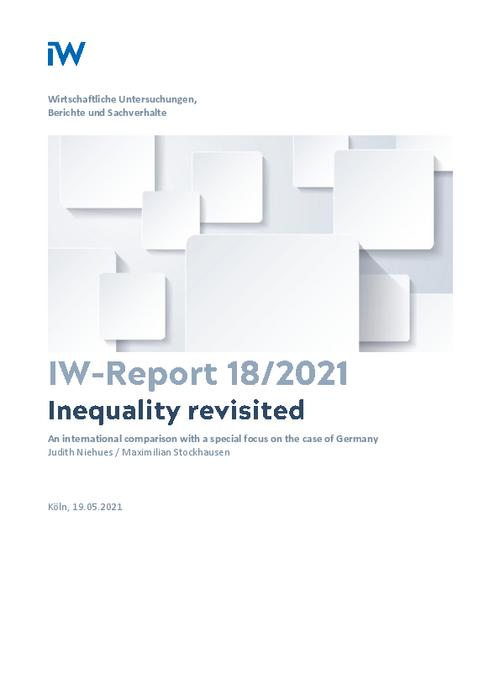
Inequality Revisited: An International Comparison with a Special Focus on the Case of Germany
This report summarizes the latest findings on the development and levels of global income and wealth inequality and puts special emphasize on the situation in Germany.
IW
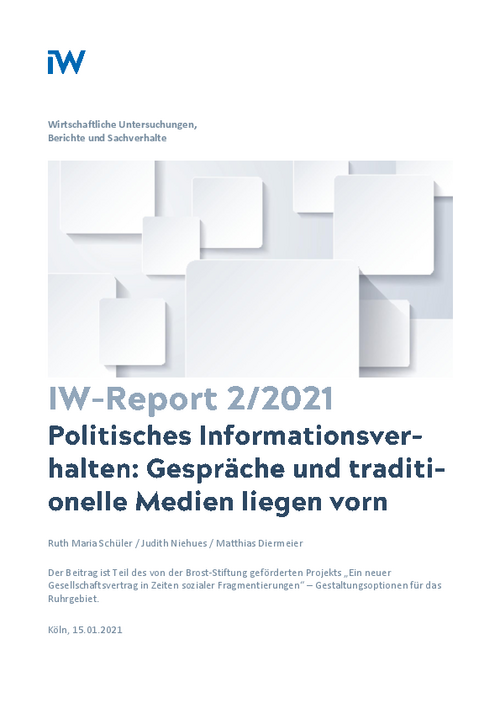
Political Information Behavior: Conversations and Traditional Media Lead the Way
How Germans inform themselves about political events: Personal conversation and use of traditional media come first.
IW
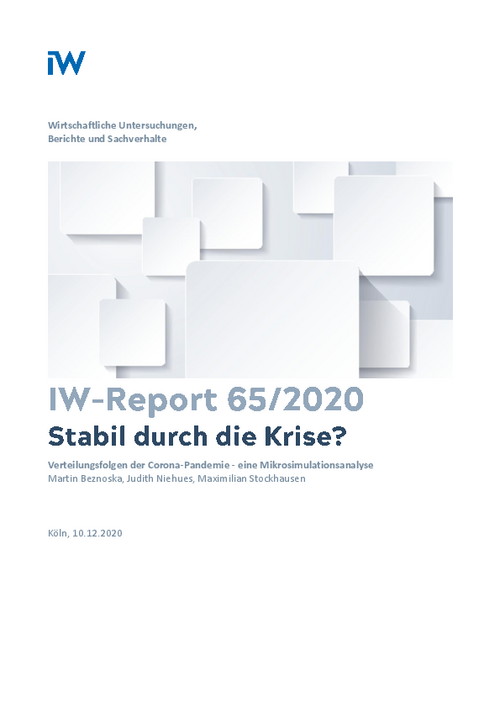
Stable Through the Crisis?: Distributional Consequences of the Corona Pandemic - A Microsimulation Analysis
The corona pandemic has had a decisive impact on the year 2020 and, at least in recent times, has had an unprecedented (negative) impact on society and the economy. At the core of this simulation study is therefore the question of how the corona pandemic has affected income levels and social inequality in Germany, and to what extent automatic stabilizers of the social security system and additional financial aid measures have been able to cushion distortions caused by the crisis.
IW
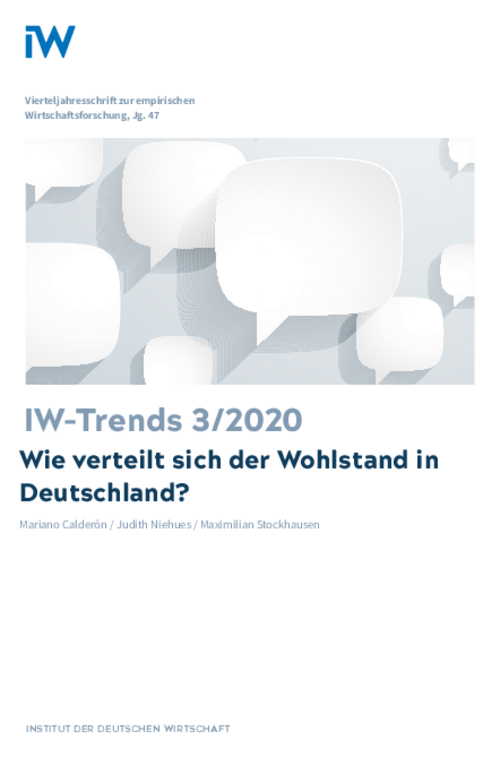
How is Prosperity Distributed in Germany?
Distributional analyses often focus on either income or wealth. However, a comprehensive picture of the material well-being of a nation’s households can only be obtained by considering both variables together.
IW